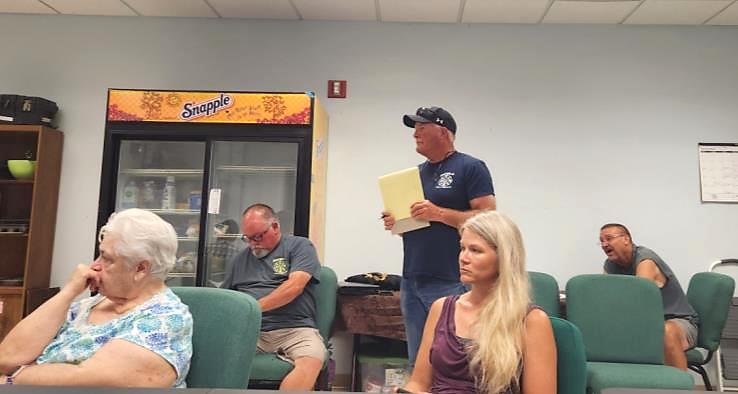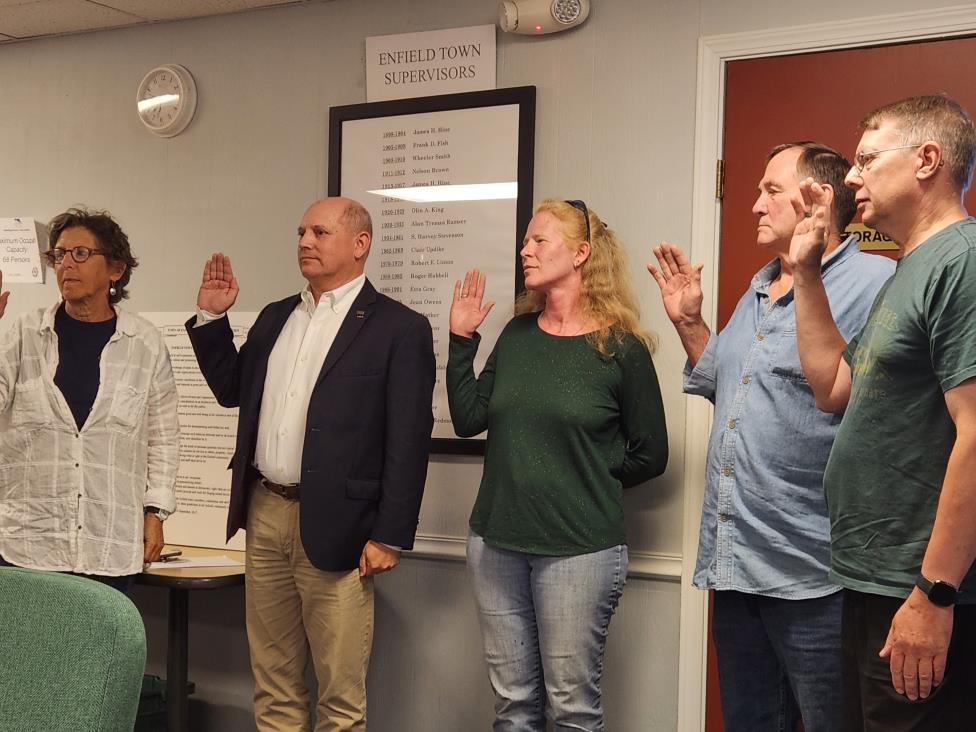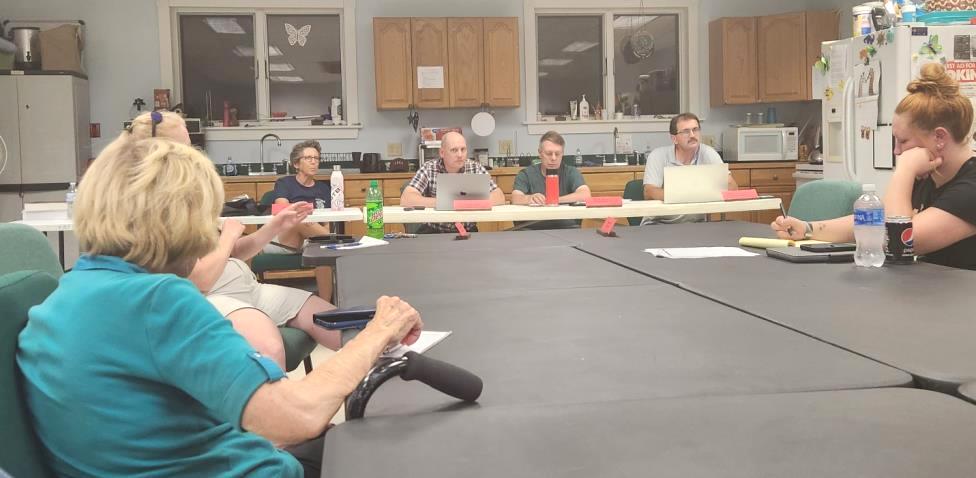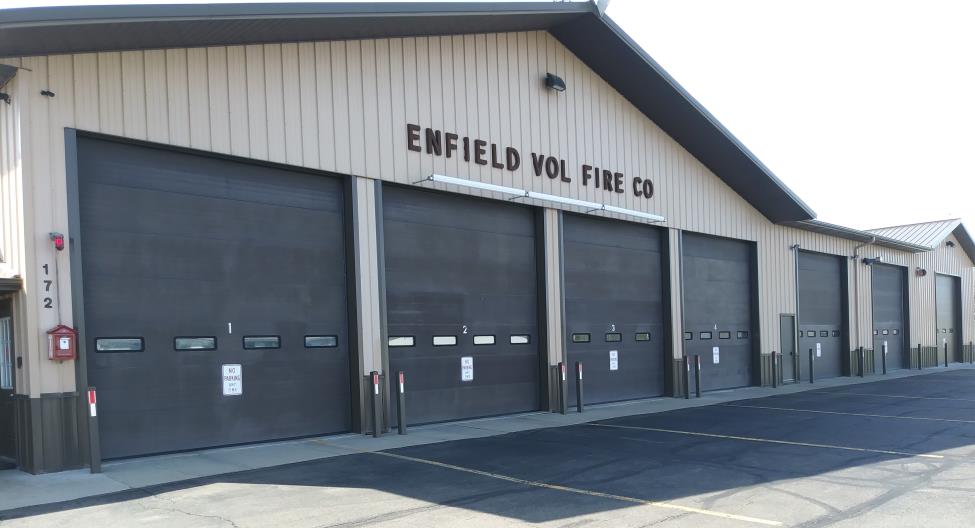Contrasting opinions punctuate Pre-election Hearing
Reporting & Analysis by Councilperson Robert Lynch, September 9, 2023
Greg Stevenson, Enfield’s Fire Chief, called it “one of the many quirks of Fire Districts in New York State.” And because the Enfield Town Board opted last June to transition its oversight of fire services to a Fire District run by a Board of Commissioners, Enfield inherited that “quirk” when it did.

Tuesday, September 12th, voters must decide whether to increase the Enfield Fire District’s “Statutory Spending Limit.” It’s a hard-number spending cap that’s keyed to the aggregate assessed value of properties in the town. And because Enfield is a relatively poor town when it comes to assessments, the Albany-set spending limit is low as well.
Voters can elevate the spending limit, if they choose. And Tuesday they’ll be asked to do just that. The proposition to be put before the electorate in just days would elevate the annual spending cap to $575,000. It would be a figure good for each of the next five years. It’s about double what the Enfield Fire District would be able to spend without voter approval.
Also on Tuesday’s Enfield ballot are propositions to establish two capital reserve funds for the Fire District; one for vehicle purchases and replacement, the other to buy equipment.
“If we do nothing, that (state) formula would arbitrarily force us as our first official act as a District to cut the Fire Company’s existing budget nearly in half,” Jim Matthews, newly named Chair of the Enfield Board of Fire Commissioners, cautioned attendees at a Public Hearing last Wednesday. Matthews employed the hearing to frame his best case for voting “yes” in the upcoming referendum. Refusing to increase the limit, he warned, “would be pretty disastrous for a lot of reasons.”
Worst case, Matthews informed the hearing, “We would have to get rid of apparatus. You’re basically having to shed obligations in order to get under that cap.”
When our Town Board contracted with the Enfield Volunteer Fire Company (EVFC) for fire protection—as it has under an agreement that will end this December— the Statutory Spending Limit did not apply. But had it done so, the current EVFC contract would have spent well beyond it.
Numbers bandied about at Wednesday’s hearing varied. But this we know. The Town Budget allocated $377,685 to the EVFC for 2023. The spending cap’s adherence could have constrained allowed spending to just $273,000, or maybe lower. That’s a theoretical 28 per cent reduction.
Yet raising the limit nearly $200,000 above current Fire Company spending did not rest well with some at the Commission’s hearing. Applegate Road’s Diane Aramini, arguably Enfield’s most outspoken critic of the EVFC, found it excessive.
“I just kind of feel the public was misled from the get-go,” Aramini said at the hearing. Aramini has argued at past meetings that transition to a Fire District was sprung onto the citizenry with too much haste and too little discussion. Aramini may have a point. Current Town Board members didn’t even talk about forming a Fire District until March of this year. And this writer/Councilperson’s efforts to slow the process fell on deaf ears.
Fairfax County, Virginia is where Jim Matthews, a relatively recent transplant to Enfield, served for many years as a firefighting volunteer. And he says he loved every minute of it. But as he moderated Wednesday’s 45-minute Public Hearing—before he took it upon himself to gavel it closed—Matthews became a frustrated man. His patience wore thin. And it showed.

Our Fire Commissioner’s Chairman quickly learned that fire service spending in Enfield is perhaps the hottest of hot-button issues in this town (aside, perhaps, from fracking and windmills). And with Fire Company supporters and critics drawn to their respective corners Hearing night, the referendum’s outcome remains anyone’s guess.
“Many people opposing the Fire Company in general have a direct financial interest in the [Town’s] Highway budget,” Ellen Woods, a volunteer firefighter, EMT, Fire Company officer and former Enfield Town Clerk, alleged. “As the Clerk, I know there is very little money in the Town,” Woods continued, “and Fire and Highway fight over it.”
Woods supports raising the spending limit. Aramini opposes doing so. The two traded verbal barbs across the room at one point. Chairman Matthews had to rein them in. Aramini and Woods were the most vocal of the approximately 20 residents who attended that night. Many attendees were known members of the Enfield Volunteer Fire Company (EVFC). Most of them remained silent.
Over and over, Matthews sought to pull back the conversation to just one issue: whether to raise the Statutory Spending Limit. But those in the room sought to enlarge the issue. Critics wanted to encompass Fire Company spending in general, including an $850,000 newly-purchased pumper truck’s impact. That truck’s financing could add as much as $112,000 to next year’s EVFC outlay.
“It’s not a tax increase,” Matthews insisted regarding what’ll face the voters. “We’re not asking anybody to pay more taxes. We’re not going to raise the budget of the Fire Company. We are trying to make the math match what the Fire Company already has. That’s the objective.”
“It’s just a limit,” Commissioner Robyn Wishna pleaded to the room’s skeptics. “We’re not going to use that limit per se. And we’re hoping not to use it for even five years.”
“We don’t want the Fire Company to default on its loans,” Matthews pointed out. We don’t want the Fire Company to have to dip into whatever savings they had (they have little) to try to avoid default. And these are all really terrible outcomes and deeply unnecessary.”
“And how can it not raise taxes?” Aramini pressed the Commissioners.
“Because this is the budget that already exists,” Matthews answered, “and these are the moneys that already exist.”
“It’s not,” Aramini pushed back. “They were not getting that money from the Town.”
Aramini was right. Town appropriations for the EVFC never came close to $575,000. With the referendum’s passage, they could.
But as Public Hearing attendees continually doubled-back on budgets and fire trucks, and as the Commissioners’ Chair persistently attempted to steer the hearing’s travel back to his own preferred lane, one could objectively argue that those at the head table, at times, didn’t get it. They failed to sense the linkage that some in the audience clearly saw.
One man in the back of the room took his turn to speak:
“So if the cap is 575, or whatever; but you’re not going to use it, the potential is there every year to reach that level, right?”
“If something were to happen, yes,” Matthews conceded. But then, he quickly added, “It doesn’t happen automatically. The Fire Company wouldn’t be able to just decree it. That’s what we’re here to do as a Fire District; to oversee that process.”

But the Fire District’s Commissioners have yet to draft a budget for next year. And unlike school districts, the public doesn’t get to vote on a Fire District budget. They only decide the spending limit. Next Tuesday’s referendum provides them their only veto opportunity. And use it they may. For those who doubt the Enfield Volunteer Fire Company’s frugality, that veto is their weapon. It’s power.
“This has nothing to do with the taxes, period,” Fire Commissioner (and Highway Superintendent) Barry “Buddy” Rollins insisted as Aramini pressed the Commissioners on whether tax rates were in play.
“And do we get to vote on the tax rate?” Aramini questioned. “I’m assuming no?”
“You don’t get to vote on the tax rate,” Matthews interjected. “The tax rate is going to be whatever the tax rate is.”
Technically correct, yet misleading. The budget’s size sets the tax rate. And the spending limit bridles the budget. They’re all interconnected.
The hearing brought errors along the way that can easily disturb the skeptical mind.
“Right now, the budget of the Fire Company today is over $500,000,” Chairman Matthews said five minutes into the hearing.
No, I corrected him a few minutes later, budget papers in front of me. This year’s appropriation is 377 thousand.
“That did not include the purchase of a new truck, to replace an old truck that needed to be decommissioned,” Board member Geoff Hollister qualified, Hollister attempting to wriggle the Commission out of a glaring factual misspeak.
But the fire truck’s expense doesn’t kick in until 2024, I noted, “so the people don’t get the impression that our Town Board last year approved a $500,000 budget.”
At Town Board hearings, we typically allow each speaker three minutes to make his or her point. Matthews ran his hearing more like a seminar. Nobody’s remarks were timed. A record of who spoke—and who might have chosen to speak, if only called upon —was never kept, or acknowledged.
“I have zero clue legally whether I can adjourn the hearing and let it go informally after,” an increasingly- frustrated chairman said after some 36 minutes of back and forth. “I don’t know, but I think that’s what we need to do” (namely close it down).
About ten minutes later, Jim Matthews gaveled the hearing to a close. Some attendees would rather have kept talking.
In its purest sense, Wednesday’s “Public Hearing” wasn’t really a “Hearing” at all. Usually, a hearing comes before a public entity’s decision to put something to referendum. In this instance, the ballot is already set. No one can change it. Nothing that anyone said at the hearing could have altered what’ll go before voters. If majority consensus had called for a lower spending limit, no one could have revised the numbers. More correctly put, Wednesday’s was an informational meeting. The law requires a hearing. Was it legal? Probably. But the attorney, Brad Pinsky, was nowhere to ask. Counsel, I was told, was tied up in trial.
Fire Chief Stevenson rendered brief comments near the hearing’s end. He supports the referendum’s passage. “The attorney and the Board, they hashed it out,” Stevenson said. “They agreed upon it. It’s good business. I support doing it.”
Equally supportive is EVFC President Dennis Hubbell, though he acknowledged seeing stumbles along the way.

“Even though the water seems to be a little rough at this time,” Hubbell said, “I think the Town and the Fire Company made the right decision by going to a Fire Commission.”
Though they expressed informal support, Fire Commissioners declined later that night to officially extend voting hours for Tuesday’s referendum without first consulting their attorney. By Thursday, they had and they did. As now revised, voting will take place at the Enfield Community Center Tuesday, the 12th, beginning at 3 PM and ending at nine that night.
One final note: Please allow me, your Councilperson, the comfort of neutrality. I’m a Town Board member. I’d rather not tip the scales either way with my opinion. Moreover, I’ll be a volunteer overseer of the election that day. When you drop your paper ballot into Jim Matthews’ makeshift ballot box, neither you nor I should know our respective preferences.
Please make an informed choice. I hope this reporting helped you decide.
###

